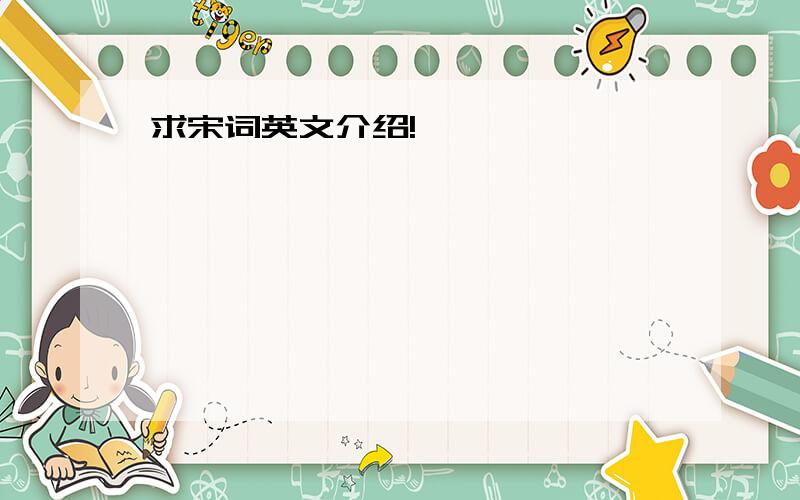求宋词英文介绍!
来源:学生作业帮助网 编辑:作业帮 时间:2024/04/26 15:58:14

求宋词英文介绍!
求宋词英文介绍!
求宋词英文介绍!
The Lyrics of the S'ong Dynasty (宋词)
The ci 词 lyric is very different from the shi type. Today the term ci simply means "word". While the older Tang Dynasty shi lyric can be read without minding the underlying melodies - even if there existed some underlying melodies - ci poetry must be seen as written songs. Most of the poems do not even have their own title, but they are named after an original melody. Composers and writers used this melody to write a new poem that could be sung to the original famous melody or tune pattern (cipai 词牌), a technique called contrafactury. This is the reason why we often see the same title for a ci poem, like Die lian hua 蝶恋花 "Butterflies love blossoms", Man ting fang 满庭芳 "Scent fills the hall", or Yu meiren 虞美人 "Lady Yu". There are more than 800 tune patterns. Ci lyric emerged during the Tang Dynasty in response to the popularity of foreign musical tunes imported from Inner Asia.
During Song Dynasty, two different styles of ci poetry developed, the haofang 豪放 "heroic abandon", and the wanyue 婉约 "delicate restraint". Like shi poetry was still in use during the Song Dynasty (see an example of a Lu You shi), ci lyric again became very popular during the Qing Dynasty. Even the communist chairman Mao Zedong is considered to be a great ci poet.
The "Three Hundred Song poems" (Song ci sanbai shou 宋词三百首) anthology was compiled by the "Jiangcun ci club" Shangjiang Cunmin 上强村民 under the guidance of Zhu Zumou (1859-1931) 朱祖谋. Except the examples below, there are some famous Song poets, like Wang Yucheng 王禹偁 (954-1101), Liu Yong 刘永 (980-1053), Yan Shu 晏殊 (991-1055), Mei Yaochen 梅尧臣 (1002-1060), Shao Yong 邵雍 (1011-1077), Wang Anshi 王安石 (1021-1086), Huang Tingjian 黄庭坚 (1045-1105), Qin Guan 秦观 (1049-1100), Zhao Buzhi 晁补之 (1053-1110), Chen Shidao 陈师道 (1053-1102), Ye Mengde 叶梦得 (1077-1148), Li Qingzhao 李清照 (1084-1155), Yang Wanli 杨万里 (1127-1206), Chen Liang 陈亮 (1143-1194), Jiang Kui 姜夔 (1155-1221), Shi Dazu 史达祖 (1163-1220), Liu Kezhuang 刘克庄 (1187-1269), Zhou Mi 周密 (1232-1298), Wang Yisun 王沂孙 (1240-1290), and Zhang Yan 张炎 (1248-1320). Of course, every official engaged in writing ci poems as authorship of poems belonged to the basic knowledge of the upper class.